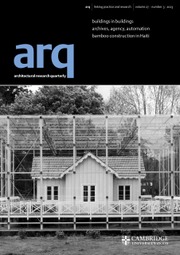Article contents
New tenements and the image of the past: the Crown Street development in Glasgow's New Gorbals
Published online by Cambridge University Press: 13 November 2013
Extract
In 2000, the Crown Street redevelopment in Glasgow's New Gorbals area was completed following a masterplan by Piers Gough and building designs by Page and Park, Elder and Cannon, Hypostyle Architects and others. Built on symbolically contested ground previously occupied by the Gorbals tenements (1870s–1960s) and the high-rise Hutchesontown flats (1960s–1990s), the new development is a textbook example of neotraditional design. The project features ornamented facades, bay windows, courtyards and corridor streets along with local references to the heyday of Glasgow tenements during the late nineteenth century.
This paper shows that the new tenements on Crown Street contributed to Glasgow's economic revival strategies by reconfiguring the site and supporting a positive view of Glasgow's Victorian era. In this sense, the architects adapted design preferences – which at the time were evident all over Europe and North America – to a local agenda.
The new tenements reconcile conflicting perspectives: on the one hand a break almost as comprehensive as the urban renewal of the 1960s, and on the other hand an idea of historical continuity and long-lasting community life, which rested on a revised conception of the city's industrial past. Conveying a historical image cleared of imperfections they communicate a message of permanence that stands in stark contrast to the area's historic upheavals, but nonetheless contributed to the viability of the new neighbourhood.
- Type
- History
- Information
- Copyright
- Copyright © Cambridge University Press 2013
- 1
- Cited by




